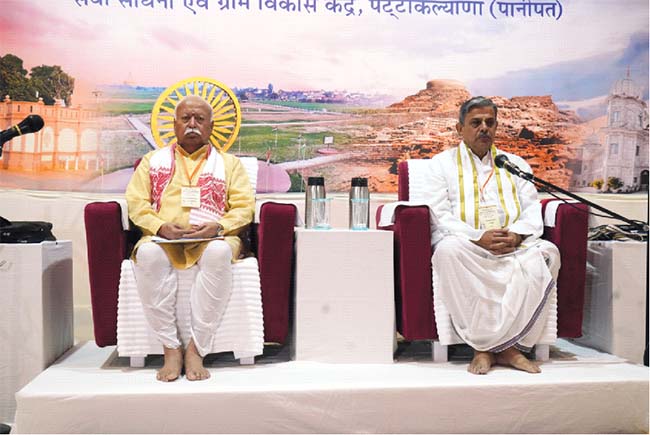“In line with the celebrations of Amrit Mahotsav, we should also introspect that if the very purpose of freedom was to achieve self–reliance, then, in 75 years, is Bharat completely self-reliant as yet? In 1947, we took an oath to make Bharat the greatest and bring an era where Bharat will show the light, the path, and lead the rest of the world. But, for that, we need clarity, specificity, and a sense of direction in both our thoughts and actions”.
–Dr Mohan Bhagwat, Sarsanghchalak, Rashtriya Swayamsevak Sangh, in his speech on August 14, 2022
As the centenary year of Rashtriya Swayamsevak Sangh (RSS) is approaching, everyone expected some big-bang celebratory preparations in the annual top-level meeting of representatives called Akhil Bharatiya Pratinidhi Sabha (ABPS). Contrary to the media expectations, Sangh did not touch on the issue of the upcoming General Elections in 2024. As Sarkaryavah Dattatreya Hosabale clarified in his press conference, like all other inspired organisations, Swayamsevaks representing Bharatiya Janata Party also shared their annual organisational achievements in the allotted time slot. Instead, the three-day-long meeting in the rural background of Patti-Kalyana village near Panipat set the agenda for the organisation and the entire nation for the Amrit Kaal – the next twenty-five years. Why is this Amrit Kaal important for the RSS and Bharat as a Rashtra?
What key agenda issues has the largest voluntary organisation flagged?
Amrit Kaal is the period between night and day when the darkness of night is about to be over, and the Sun is about to rise – the golden period to meditate and positively resolve for a bright and productive day. In national life, there are moments when you are in a take-off stage, and Bharat can realise the potential if the energies are channelised in the right direction. RSS is seeing that kind of situation for Bharat in the next few decades.
For the sake of Bharat, RSS went into a reflective mode and assessed the organisational targets. The organisation that has brought the nation out of its slumber and awakened the society on civilisational values is still concerned about the inability to reach each and block of the country. The secret behind RSS’ success is the continuous and relentless process of self-actualisation for realising the daunting task of taking this nation to the pinnacle of its glory. RSS tends to inculcate the same spirit in the entire population. What we achieved in the last seventy-five years in terms of vibrant democracy is not a small feat, but certainly not up to our national potential is the RSS concern.
The focus now is not just quantitative but qualitative expansion. With the swelling numbers and growing acceptability and expectations, Sangh has decided to tweak the training programmes and introduce a three-day preliminary orientation programme (Pravesh) so that more people contribute to the national objectives. Other training camps will also see some changes with a more specialised kind of training both for social and intellectual activities. Not just organising a regular Shakha activity but also undertaking transformative work in collaboration with the local community is the focus point now. Based on community surveys, many Shakhas have identified the problems and initiated participatory activities to resolve the local issues, such as eradicating caste-based discrimination and maintaining temples, water bodies and crematoriums. Social harmony and environmental protection are the priority areas for the RSS, along with the emphasis on civic duties to spread patriotic voluntarism in society.
Bharat can only play its global role if impending social issues are resolved and a shared sense of nationhood is built. Besides the internal reform process, the colonial legacy hanging over the intellectual minds and anti-Bharat forces tactically aligned to create new faultlines are the main obstacles in this process; hence, the call for decolonisation based on Swa.
RSS is striving to organise and invoke the Sajjan Shakti (righteous power) of Bharat. The RSS’s expansion plan is not for the sake of the organisation itself but to merge seamlessly with the society. The renewed emphasis on expansion, outreach and coordination in the Amrit Kaal should be seen in this light.




















Comments